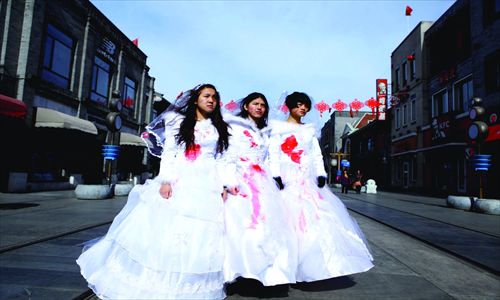Girl power


"If you see a bald-headed girl standing there looking a little bit stupid, that would be me," Xiao Meini laughed. Xiao, 24, a pretty girl always wearing a shy smile, is one of the "Bald Sisters" who have become a hot issue of late.
On August 30, 2012, four girls, including Xiao, shaved their heads in Guangzhou, Guangdong Province, to protest against gender discrimination in university admission rates. A day later three more shaved in Beijing. "This is just one of the feminist activities that my friends and I have been doing."
Grass-roots feminists and NGOs in action
Xiao and her friends have their reasons for choosing such an interesting way to grab attention. "Hair has symbolic meaning for women, so a bald head represents a complete break with the traditional social image of a woman," said Xiao.
Many people, men and women, shaved their heads and posted photos online to support them. "We didn't expect so many strangers to support us. And the media exposure is also beyond our imagination," Xiao noted. "Shaving my head was totally worth it."
It was not the first time Xiao and her friends went public to defend female rights. They have long been concerned about domestic violence, sexual harassment, inappropriate gender ratios in public restrooms and so on.
The themes of the activities have been interesting, like "Occupy the Men's Room", "Bloody Wedding Gowns", "Just Because I'm Slutty, Doesn't Mean You Can Be Dirty" and so on. "The reason those were successful is that the discussion could be interesting, contradictory and dramatic," Xiao said.
"We are 'grass-roots' feminists," she added.
"Being 'grass-roots' indicates that the unification of people sharing the same belief is spontaneous, and the resources are inadequate," said Xiong Jing, an expert with Media Monitor for Women Network, a non-governmental organization (NGO) based in Beijing.
There are about 70 registered NGOs in Beijing specializing in gender equality and women's rights, according to Liu Haiying, chief editor of China Development Brief, an online and print publication reporting on China's growing nonprofit and philanthropic sectors.
"Most of these NGOs are small, with a minimum of two or three workers, and a maximum of 20 or 30, struggling in Beijing," said Xiong. "Surely we are grass-roots NGOs," she laughed.
Progress and problems
"There has been great progress recently," Xiong remarked. "More young activists have joined us, which means the team is more active and creative."
Now they have more means than just classic ones, such as writing articles, giving lectures and providing psychological consultation. "The first new way is using new media, like websites, e-papers, and microblogs," Xiong said. "The second is putting on street shows to grab attention."
"These grass-roots activities are good," said Song Jialun, an expert at the Beijing Gender Health Education Institute. "They are alive and effective, encouraging greater participation and discussion."
Difficulties emerge despite progress. For one thing, their financial and human resources are limited. "Financial problems are the primary and most realistic concerns," Xiong said. "Some of us suffer from fund shortages."
Additionally, social prejudices cannot be changed in a day. Xiong and her colleagues have encountered a lot of questions and misunderstandings. "There are voices of doubt and critics against us," she said.
In China, especially Beijing, things have been different from other regions, and more difficult.
The social conventions have taken root for generations. "Women are educated to be somebody's wife and somebody's mother, but not herself," Song said.
The political environment is not so favorable for the activists, either. Xiao told Metro Beijing that she felt "more obstructed" in Beijing. And Song agreed, "It's more sensitive here."
To overcome these difficulties, the girls intend to repeat their opinions again and again, and engage in more practical action, to make their voices heard and to dispel any misunderstandings, explained Xiong.
"By expanding into channels like the Internet, we hope more talented people will know about us and join us," Xiong added, who says China does not have big organizations like the West does, and so change will take time.
The moral and political environment is different from the West, and so grass-roots feminists tend to use all kinds of performance arts to help them. "The Westerners can do their parades, and we can do our flash mobs," said Xiong.
Their own voices and dreams
"Though my parents know about me working for female rights and are very supportive, they still want me to get a profitable job, one by the book,'' said Xiao. However, working for an NGO dedicated to female rights is her dream.
Xiao is confident about her work, feeling that she is really making a change and impact on society.
Of course her achievements have been accomplished through hard work, but it is worth it. Topics of female rights have attracted public attention, and people are now actively following, discussing and debating these issues.
With this, more girls like Xiao are dedicating their efforts to sexual equality.
Zheng Churan, 23, a graduate from Sun Yat-sen University in Guangzhou Province, is very concerned about workplace equality. On April 26, 2012, to protest against gender discrimination, she mailed 500 letters to the CEOs of China's top 500 enterprises.
Shaanxi Women's Federation then contacted Zheng and promised they would investigate and affix the responsibility for workplace inequality if anything negative was reported in Shaanxi Province.
This gave Zheng strength to carry on. With a diploma in sociology, Zheng has a clear-headed understanding of what feminism means today. "Feminism is pure and noble, something worth working for," the girl remarked.